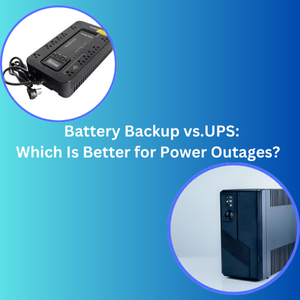
The main difference between a battery backup and an Uninterruptible Power Supply (UPS) is that a UPS is more advanced and can provide a continuous power supply during outages, while a battery backup is a simpler solution that only provides temporary power.
In today's business world, power outages do not simply interrupt operations; instead, they mean unwanted downtime, loss of data, and severe damage to much-needed IT systems. Any business dependent on technology for its daily operations must ensure it has a viable means of protecting its equipment from possible eventualities associated with sudden loss of electric power. On the one hand are battery backups, while on the other are uninterruptible power supplies (UPS). Knowing which one is appropriate for your company requires understanding some key differences.
This blog will help users compare UPS versus battery backups and weigh their pros and cons before identifying how Long Island-based businesses, including those utilizing IT Services Company Long Island, can benefit from employing the best power protection system.
What Is a Battery Backup?
A battery backup is a device that provides a temporary electric supply during power outages. Its main purpose is ensuring critical devices like computers or networking hardware keep running long enough for users to either save their documents or safely shut down systems. The use of such devices on small electronics has become more common as they only serve to maintain power levels long enough to cover minor outages or support an orderly shutdown.
Battery Backup's Key Features
-
Temporary Power: Provides a limited amount of power that normally lasts from a few minutes to several hours, depending on the battery size.
-
Limited Load Support: Usually supports low-power devices like personal computers, modems, and routers.
-
Shutdown Support: Allows users enough time to save work or turn off their machines safely.
-
Affordable: Cheaper compared to UPS; hence, it is suitable for smaller companies running fewer critical systems.
What Is An Uninterruptible Power Supply (UPS)?
A UPS is an advanced solution that provides continuous power during an outage. Unlike battery backup, which has a limited time, a UPS switches instantly to battery mode without interference with the supported equipment. This makes it ideal for protecting sensitive IT infrastructure, including servers, network switches, and storage devices.
Main Functionalities of UPS
-
Immediate Power Transfer: Ensures continuous functioning despite blackouts by giving backup electricity instantly.
-
Increased Load Capacity: Able to support large machines and critical systems like servers, network devices, and even complete data centers.
-
Voltage Regulation: Voltage regulation and protection against surges are some power conditioning features incorporated in many UPSs that prevent devices from spikes or fluctuations.
-
Extended Runtime: Depending on its size, a UPS can provide hours of electricity, enabling companies to keep running during long-lasting outages or move to a generator.
Battery Backup vs. UPS: Key Differences
| Feature | Battery Backup | UPS |
|---|---|---|
| Power Transition | May have a brief delay | Instant, no interruption |
| Load Capacity | Suitable for smaller devices | Can support servers and critical equipment |
| Surge Protection | Basic surge protection | Advanced surge protection and voltage regulation |
| Runtime | Short-term power (minutes to hours) | Long-term power (hours) |
| Cost | More affordable | Higher upfront investment |
How Do You Know Which is Better for You Regarding Power Outages?
The answer depends on your specific needs. A battery backup may be enough for a home office or small business with minimal equipment, but for most companies that rely heavily on IT infrastructure—especially for businesses located that require expert-managed IT services on Long Island—a UPS is often the better option: instant power transition; it will protect far more critical systems.
Read Also: VPN vs. Virtual Desktop: What's the Difference in 2025?
Why Managed IT Services Long Island Recommend UPS
A power outage is a very different experience on Long Island than in most parts of the United States. It frequently suffers an outage from hurricanes or challenging weather conditions, sometimes hitting the business. Most companies rely on mission-critical equipment, which managed Cyber Security Consultant Long Island recommend to include in any industry that uses this kind of machinery. That's why:
UPS provides no downtime in case of a power outage, and business operations must continue uninterrupted.
-
Data Protection: These unexpected outages can cause data corruption. The UPS systems ensure that businesses have enough time to safely save data and that the servers and storage systems are shut down smoothly.
-
System Longevity: Sensitive IT devices can be damaged by power surges and fluctuations. UPS systems, therefore, provide surge protection to ensure that your hardware lives a long life.
-
Compliance and Security: Healthcare and finance industries require constant access to data and IT systems for regulatory compliance. A UPS ensures that systems are running during an outage.
At B&L PC Solutions, our business's power outages take top priority. As a well-identified managed IT services Long Island for many years, our comprehensive list of services includes the following to make sure that your systems are always running:
Installation and Maintenance of UPS:
We advise you on the type of UPS that will suit your business, help you properly install it, and then maintain it so that it runs at its best.
-
Power Outage Planning: Work with your clients to develop a comprehensive strategy to minimize the risk associated with power outages. This strategy can include backup power solutions and disaster recovery planning.
-
24/7 IT Support: Reliable Long Island managed IT services are delivered through real-time monitoring and support to sustain system functionality during a power outage.
-
Cloud Solutions and Data Backup: As an added layer of security, we provide cloud-based data backup and recovery solutions to protect your information in case of long-duration outages.
If you are deciding between a battery backup or a UPS for your business, you should consider the type of equipment that will be safeguarded, the length of time an outage in your area is anticipated to last, and how long the period of downtime will impact your operations. For most businesses, mainly where other IT services Long Island dependencies are concerned, a UPS represents the best layer of protection because it ensures power instantly and helps safeguard critical infrastructure.
If you need expert advice or assistance implementing a power protection solution, contact B&L PC Solutions, your local IT managed service provider on Long Island. Let us help you keep your business running smoothly, no matter what happens.
Tags: Battery Backup vs. UPS, Cyber Security Services Long Island, IT Company Long Island, IT Managed Service Provider Long Island, IT Services Company Long Island





